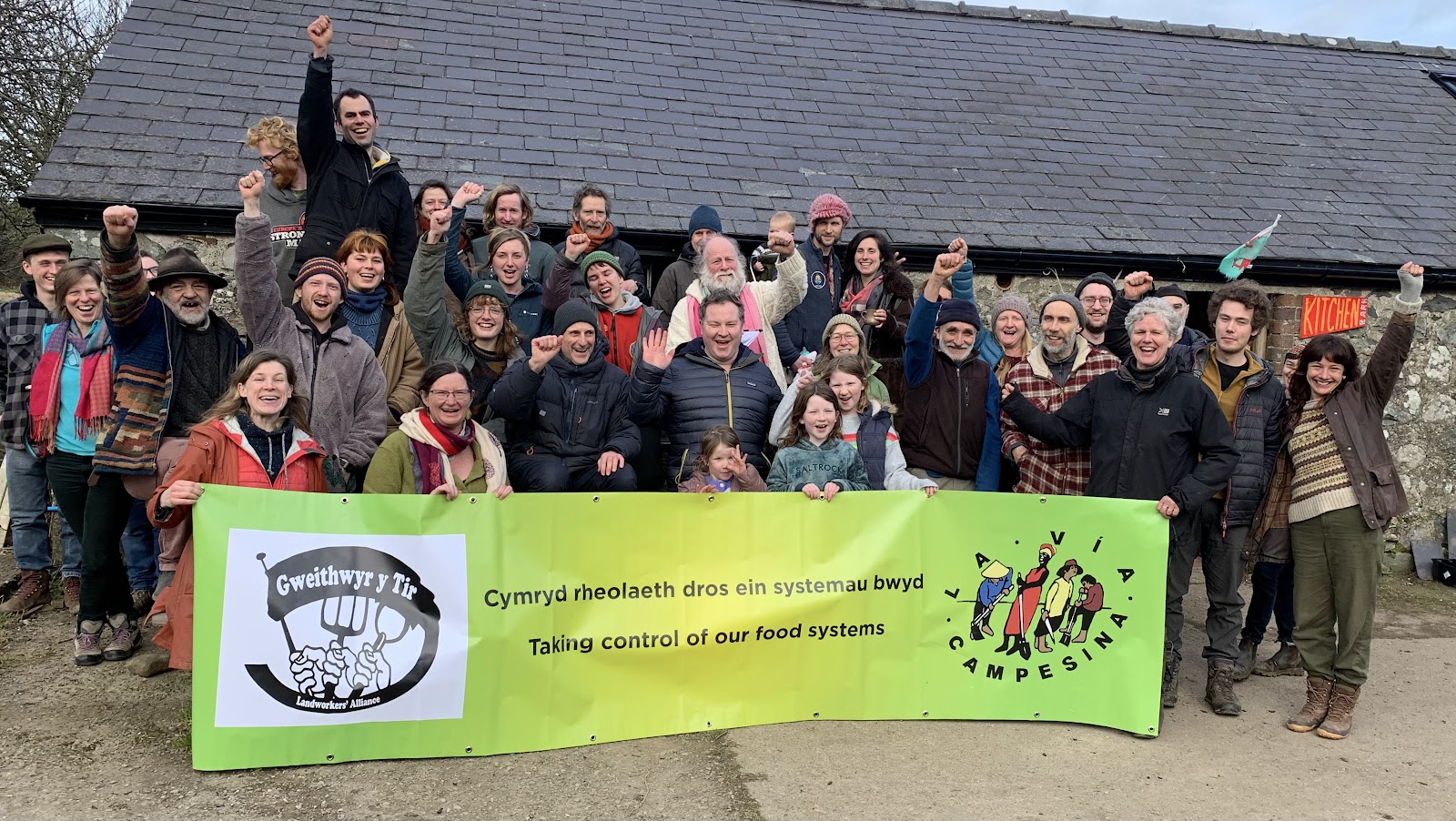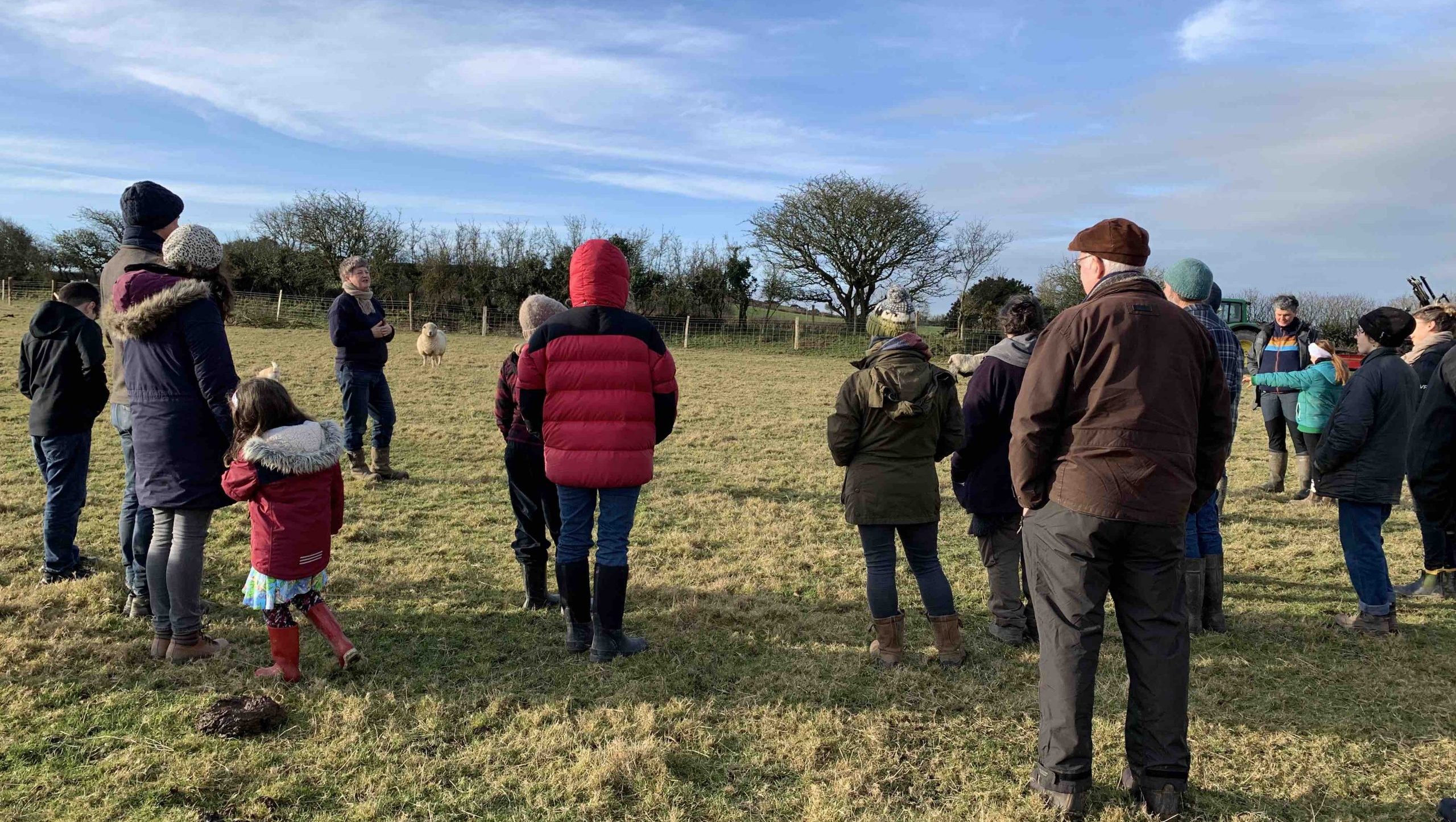LWA members in Wales are members of the Wales (Cymru) branch of the LWA; known as Gweithwyr y Tir (GyT) in Welsh.
Gweithwyr y Tir members organise and attend farm tours, participate in farmer to farmer training, and build dynamic and supportive social networks of landworkers across Wales. Each year there is a big celebration that brings together GyT members across Wales, where exciting discussions about the work and vision of the GyT and the LWA as a whole take place.
Members in Wales keep in touch through a regular bi-lingual Gwithwyr y Tir/LWA Cymru newsletter, as well as through regional WhatsApp groups for West Wales, South Wales, Mid Wales and North Wales. We are looking to develop LWA member organising in each of these regions, and encourage members who have ideas and energy to chat with the LWA Membership team and the Cymru Organising Team about getting involved!
Scroll down for more information on Member Organising and Outreach, Policy and Campaigns, and Projects.


Membership Organising & Outreach
Wales has an Organising Team who represent our members across all of Wales, but members are also organised in the following regions: West, South, Mid and North Wales. The Organising Team work to engage with members, produce regular newsletters, and organise farm visits, gatherings and events. They are supported by the Wales Membership Coordinator, Amber Wheeler. The current Cymru Organising Team are Lou, Dave, Kate, Charlotte, Lydia and Pax.
As well as linking with other groups such as the West Wales Growers Group, Cymru Organisers and Members also work with other LWA branches and groups including the UK Woody Branch, FLAME, OOTL, REAL and Women and Gender Marginalised Landworkers.
How to keep in the loop:
Cymru Newsletter
There is a regular newsletter with Wales specific information on opportunities, events, farmer to farmer training and farm visits, jobs, policy and other relevant insights. Submit information for the newsletters by either sending it to cymru@staging.landworkersalliance.org.uk or amber.wheeler@staging.landworkersalliance.org.uk
We have several regional WhatsApp groups where members can share news, knowledge, information and opportunities.
To join a WhatsApp group and become more connected to the landworkers movement in Wales please first become a member. If you are not a landworker but support the cause then why not become a supporter. This way you will receive the regular newsletters and be invited to events.
As well as communicating bilingually in English and Welsh we also have a Welsh language WhatsApp for members who like to communicate in Welsh.
If you are a member and would like to become more involved with member organising then contact amber.wheeler@staging.landworkersalliance.org.uk.
Policy & Campaigns
Agricultural and forestry policy is not the same across the whole of the UK. Wales, Scotland and Northern Ireland all have their own governments and legislatures, which decide these issues along with many other “devolved” areas that affect landworkers including:
- Environment
- Education and training
- Fisheries
- Health and social services
- Housing
- Local government
- Planning policy (although much of the detail of this is decided by local authorities)
- Tourism and economic development

In Wales, the Welsh Government generally proposes new laws and the Senedd, made up of elected Senedd Members from across Wales, scrutinises, amends and votes on legislation. You can read more about this process yma.
This means that farmers, foresters and other landworkers in Wales are primarily affected by laws created in Cardiff, rather than Westminster and for this reason the Landworkers’ Alliance does dedicated Welsh policy work.
However, this does not mean that the UK Government & Parliament is not relevant in Wales. “Reserved” topics are proposed and legislated for by the UK Government and Parliament and these include trade policy, welfare benefits and some taxation. So, we need to look at lots of areas: to understand rules about farm pollution and financial support farmers look to Cardiff, to understand what they need planning permission for, they may need to ask their local authority, but for rules about selling abroad or importing farm inputs they need to look to Westminster. Details on who decides what for Wales can be found yma.
Key areas of Policy and Campaigns for Wales:
Food Policy Alliance Cymru
LWA recognises the importance of working in coalition with other organisations that have similar aims to us in campaigning for a better food and land use system. In Wales we have joined forces with various organisations at different times. Our membership of Food Policy Alliance Cymru (FPAC) is a large part of this coalition building. You can read more about FPAC and our work yma.
The Agriculture (Wales) Bill
The Agriculture (Wales) Bill 2022, which sets out the legal basis on which Wales’ new post Brexit funding scheme, the Sustainable Farming Scheme, will be soon be implemented.
In a historic first, the aim of increasing biodiversity enhancing practices – including agroecology – has been mentioned in the Bill’s Explanatory Memorandum. Our consultation response had called for a transition to agroecology to be included in the Bill’s objectives.
The Bill itself sets out 4 Sustainable Land Management Objectives, which include:
- To produce food in a sustainable manner
- To mitigate and adapt to climate change
- To maintain and enhance the resilience of ecosystems and the benefits they provide.
- To conserve and enhance the countryside and cultural resources and promote public access to and engagement with them, and to sustain the Welsh language and promote and facilitate its use.
In addition to the provision for support for Sustainable Land Management in the form of the Sustainable Farming Scheme the Bill proposes to:
- Allow ministers to continue to make agricultural support payments to farmers during the transition period.
- Amend the Agricultural Holdings Act to provide tenants with a route to dispute resolution in certain circumstances.
- Alter the Forestry Act 1967 to give Natural Resources Wales (NRW) the power to add conditions to amend, suspend or revoke felling licences to prevent felling that would contradict other environmental legislation; and
- Prohibit the use of Snares and Glue Traps.
The initial Agriculture White Paper also included the introduction of National Minimum Standards, which will streamline and collate environmental standards. Whilst Welsh Government still intends to implement these, they do not form part of the Agriculture Wales Bill.
Our Response to the Agriculture Wales Bill
As the Agriculture Bill was being debated, LWA members and staff joined environmental organisations, the Nature Friendly Farming Network and others in a demonstration calling for the bill to be strengthened so as to restore nature and to reference the commitments made at the COP 15 Biodiversity summit.
Our consultation response supported the overall direction of travel of the Bill and its objectives, but called for a strengthening of the first objective to ensure that it would not support unsustainable food production. We also called for an additional objective of a transition to agroecology and for the Bill to address the food system overall including access to healthy food; community prosperity or food sovereignty.
We supported the purposes for which farmers could receive support, which are mainly delivering environmental benefits through their farming and enhancing public access to the land, but also called for an additional purpose of ““promoting resilient and sustainable local food systems” to be supported.
We raised concerns about the proposed eligibility criteria to include management control of at least 3 hectares of land, pointing out that this would exclude many successful fruit & veg farmers.
We also supported a joint statement from Farming Unions, environmental organisations calling for the bill to support economic viability of farms and rural communities and to get clarity on the national minimum standards.
You can see our full response to the consultation on the Agriculture Bill yma and the earlier white paper consultation response yma.
Sustainable Farming Scheme
The Welsh Government have proposed a transition away from the current Basic Payment Scheme, where payments were based primarily on area of land farmed with limited conditions attached, to one with significantly higher environmental and other obligations. The latest proposals include a universal set of obligations that all participants in the scheme will need to follow, which will likely still be area based; optional actions with environmental or social benefits for those who wish to go beyond; and collaborative actions across the landscape and supply chain. More details on the latest proposals can be found yma.
Welsh Government has been consulting on these changes since 2018 and Gweithwyr y Tir/ Landworkers’ Alliance Cymru have been responding to proposals highlighting:
- the ways in which our members are already demonstrating many of the benefits Welsh Government is seeking to achieve;
- the challenges that our members face; and
- policies changes that could help create a better food and farming system and support sustainable, living, working woodlands.
You can read our responses to key Welsh Government consultations here:
Brexit and Our Land: Securing the future of Welsh farming Consultation (2018)
Sustainable Farming and Our Land Consultation (2019)
Sustainable Farming Scheme: outline proposals for 2025 Feedback Form (2022)
The Food (Wales) Bill
The Food (Wales) Bill was intended to create a more sustainable food system in Wales and more coherent food policy making through the establishment of:
- A Food Commission:
- National Food Goals;
- A National Food Strategy; and
- Local Food Plans.
It was introduced by Conservative Senedd Member Peter Fox as a Members Bill rather than Welsh Government and despite broad support for the aims of the bill, it suffered a narrow defeat. Whilst arguing that the Bill was unnecessary and costly, and that the aims could be achieved without the Minister for Rural Affairs, Lesley Griffiths, did commit to bringing together Government departments and exploring the potential for a food strategy.
We supported the Bill’s ambitions and the broad framework it proposed. Whilst we were disappointed that it did not pass, we will continue to work with allies to hold the Minister and Welsh Government to the commitments they made.
You can see our responses to the 2021 consultations on the Food (Wales) Bill yma and the joint Food Policy Alliance Cymru response to the Bill being rejected yma.
Community Food Strategy
The current Programme for Government includes a commitment to create a new Community Food Strategy. Welsh Government have contracted consultants to engage with the community food sector and develop proposals, but very little detail has been announced yet. If you would like to contribute to our position on this proposals please email holly.tomlinson@staging.landworkersalliance.org.uk
We have referred to this in our response to the Senedd Economy & Rural Affairs Committee Consultation and our response to the Senedd Climate Change and Environment Committee Consultation.
Planning
Improving planning for small farms and foresters: Our members frequently cite challenges with the planning system as the biggest barrier to achieving their aims as sustainable farmers and foresters. We have repeatedly raised issues such as the 5 hectare eligibility threshold for permitted development rights on farms and challenges of getting dwellings on farm land with policy makers. In spring 2023 it appeared we were finally making progress as Welsh Government commissioned research into how the planning rules could be adjusted to accommodate dwellings and infrastructure on small farms. We are continuing to engage with this in partnership with others including Our Food 1200, Social Farms & Gardens, the Ecological Land Cooperative and Shared Assets.
Campaigning against factory farms: Whilst our members have faced major barriers for very modest developments, intensive poultry units have been getting consent and pollution from them has been devastating our rivers, whilst their imported feed is displacing communities and destroying forests abroad. We joined local communities, WWF, Size of Wales and others in campaigning for a moratorium on IPUs outside Senedd in February 2022.
County Farms & Community Land Access
County farms can be a route into farming for new entrants and a resource for the local community; but in many parts of the country they are being sold off. In response to the sale of Trecadwgan farm in Solva, Pembrokeshire and the community campaign to buy it as a community asset, we put together proposals for how Welsh Government could stop this happening again.
We built on this work on community land access in collaboration with Shared Assets as part of the Resilient Green Spaces programme that we are working on with Shared Assets other organisations across Wales.
This included responding to the Senedd’s Local Government & Housing Committee’s investigation into Community Assets. Building on the experience at Trecadwgan and others we called for amendments to allow communities first right of refusal when assets of community volume, including land and farms, are being sold, more support for communities, legal assurances for public bodies that sell below best financial value where there are social or environmental benefits and a simpler Community Asset Transfer Process. The Committee’s report supported many of our proposals and called for a commission to look into giving communities first right of refusal. Welsh Government have accepted the majority of the committee findings, but we are yet to see the outcome of such a commission.
You can read our response to the Inquiry into Community Assets Consultation (2022) yma.
Prosiectau
Resilient Green Spaces
Resilient Green Spaces is a £1.27m partnership project led by Social Farms & Gardens to pilot alternative re-localised food systems using communities and their green spaces as the driving force for change across Wales until June 2023.
This project is funded through the Welsh Government Rural Communities – Rural Development Programme 2014-2020, which is funded by the European Agricultural Fund for Rural Development and the Welsh Government.
Six collaborative work streams delivered by partners, are testing what communities can achieve, given the right support, access to land and freedom to do what they do best.
The three work streams that Landworkers’ Alliance were involved in include:
1. Innovative Food Hubs
Open Food Network, Development Trust Association Wales and The Landworkers Alliance have joined forces and have established five enterprising and sustainable Food Hubs in communities across Wales to provide food that is good for people, good for the environment and good for local business by promoting short supply chains. You can read more about the Food Hubs yma.
2. Exploring Community Access to Farms and Land
The Landworkers Alliance and Shared Assets have teamed up to find ways to realise the challenges and opportunities of access to land for new entrants and local communities interested in agroecological farming.
3. Building Horticultural Future Farming Skills
Lantra are using their unmatched knowledge and experience of horticulture training in Wales to develop a pilot training package covering the skills needed to run horticultural farming businesses. Training will be delivered in partnership with Cae Tan CSA and The Landworkers Alliance. Cardiff University Sustainable Places Research Institute are countering negative perceptions of careers in horticulture farming through creative engagements with young people.
WWF Cymru Case studies
Landworkers Alliance in Wales has worked with Food Sense Wales to produce a series of six case studies of agroecological farmers for WWF as part of their Land of Our Future campaign. The series covers a range of farming types and features two Landworkers Alliance members, Tyddyn Teg – a horticulture co-operative in North Wales and Nantclyd – a mixed and poultry farm. A report summarising the case study findings with policy recommendations is being launched at the Royal Welsh Show in July 2023.

